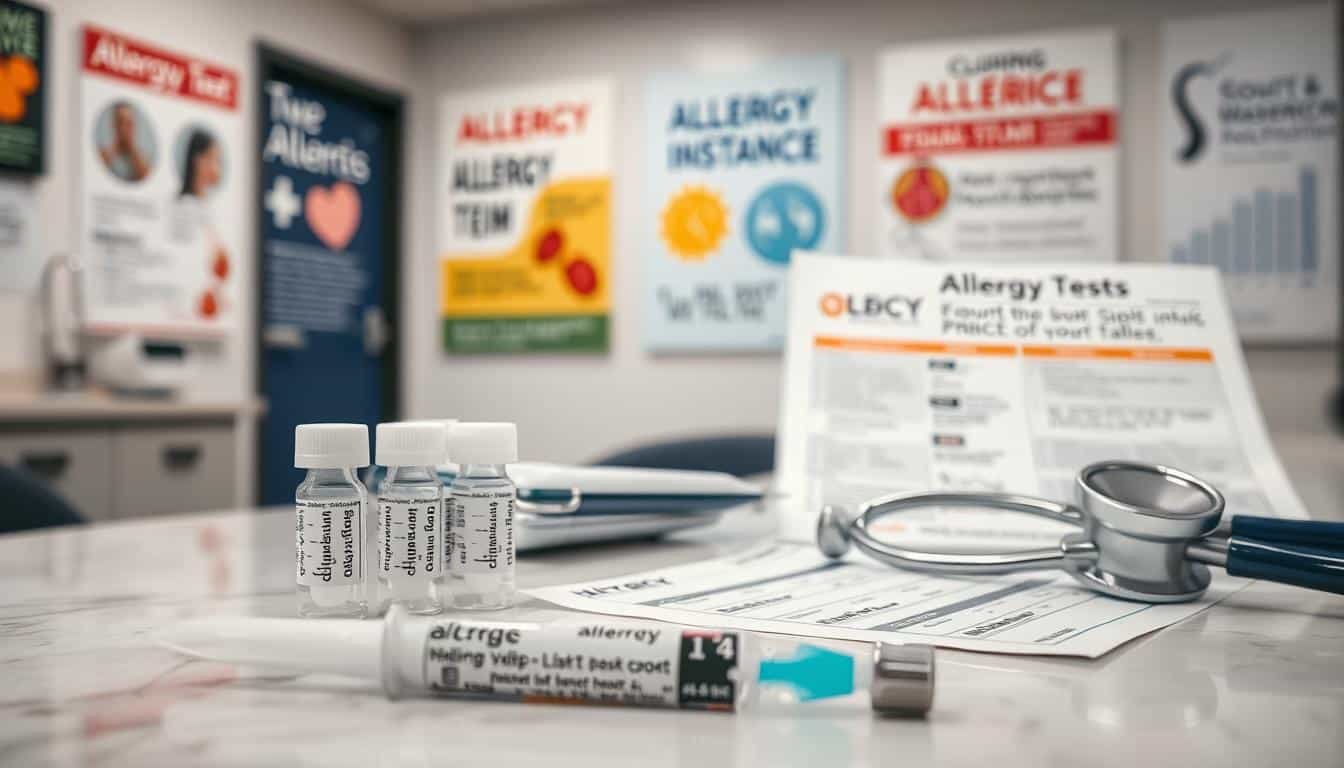Insurance: Allergy Test Cost with Insurance: What to Expect-2025
Are you worried about the cost of allergy tests, especially with health insurance? You’re not alone. Many people are unsure about the out-of-pocket costs for allergy tests.
But don’t worry, we’re here to help you understand how much is an allergy test with insurance: what to expect.
This article will cover the different allergy tests, what affects their costs, and how insurance helps. By the end, you’ll know what to expect with allergy testing costs and healthcare insurance coverage.
Key Takeaways
- Allergy tests can vary in cost depending on the type of test and your insurance coverage.
- Understanding the different factors that affect allergy test pricing can help you better prepare for the expenses.
- Knowing how your health insurance plan covers allergy testing is crucial for managing the out-of-pocket costs.
- Demonstrating medical necessity can help ensure your allergy tests are covered by insurance.
- Navigating the complexities of insurance policies and deductibles is essential for minimizing your financial burden.
Understanding Allergy Testing Costs
Allergy testing costs can vary a lot. This depends on the test type and other factors. Skin prick tests and blood tests are the most common, each priced differently.
Types of Allergy Tests
Skin prick tests apply small amounts of allergens to the skin. They watch for reactions. These tests are usually cheaper, costing between $50 to $300.
Blood tests, however, check for specific antibodies in the blood. They show if you have an allergic reaction. Blood tests are pricier, costing between $100 to $500.
Also Read: AutoZone Insurance Quotes: Find Your Best Coverage.
Factors Affecting the Cost
- Number of allergens tested: The more allergens tested, the higher the cost of the allergy testing.
- Testing method: Skin prick tests are generally less expensive than blood tests.
- Geographic location: Allergy testing costs can vary depending on the region and the healthcare providers in the area.
- Physician and facility fees: The cost of the test can be influenced by the healthcare provider’s fees and the facility where the test is performed.
Insurance coverage and deductibles can also affect the total cost. Knowing these factors helps prepare for the financial side of allergy testing.
| Allergy Test | Average Cost |
|---|---|
| Skin Prick Test | $50 – $300 |
| Blood Test | $100 – $500 |
“Understanding the cost of allergy testing is crucial in ensuring that you can access the care you need without significant financial burden.”
Insurance Coverage for Allergy Tests
Many people worry about the cost of allergy tests. Luckily, most health insurance plans cover these tests. But, how much they cover can vary a lot.
Determining Medical Necessity
Insurance companies look at a few things to decide if a test is needed:
- The patient’s symptoms and medical history
- The impact of the allergy on the patient’s health and life
- If the test can help find good treatments
If they say the test is needed, you’ll pay less. But, if they don’t think it’s needed, you might have to pay the whole cost.
Understanding Your Plan’s Coverage
To get the best coverage for your tests, know your insurance plan well. This includes:
- Deductibles: What you pay before insurance kicks in.
- Copays: A fixed amount for a service, like a test.
- Coinsurance: What you pay after meeting your deductible.
Knowing these terms and your plan’s coverage helps you plan for test costs.
Understanding your insurance can be hard. But knowing about allergy test coverage is key to your health. Work with your doctor and insurance to get the tests you need without breaking the bank.
How Much Is An Allergy Test With Insurance: What to Expect
Understanding the costs of allergy testing with insurance can be tricky. Knowing what to expect helps you plan and budget better. The cost of an allergy test varies based on the test type, your insurance, and any deductibles or co-pays.
Your insurance plan plays a big role in the cost of an allergy test. Most plans cover 80-100% of the cost after you meet your deductible. But, coverage can differ, so it’s crucial to check with your insurance.
You might also have to pay a co-payment for each service. Co-pays for allergy tests can be between $15 and $50 or more, depending on your plan. If you haven’t met your deductible, you’ll have to pay the full test cost until you do.
The total cost of an allergy test can also depend on the tests done, the lab used, and any extra fees from your healthcare provider. To get a clear idea of what you’ll pay, talk to your healthcare provider and insurance before the test.
“Understanding the potential costs associated with allergy testing can help you make informed decisions and ensure you’re prepared for any financial obligations.”
Knowing the factors that can change the cost of an allergy test with insurance helps you plan better. This way, you can have a smoother and less stressful experience.
Skin Prick Test Costs
Skin prick tests are a common way to find out what causes allergies. They work by putting small amounts of possible allergens on the skin and watching for reactions. Knowing how much these tests cost can help people get ready for the financial side of allergy testing.
Procedure and Pricing
The test starts with the doctor putting small amounts of suspected allergens on the skin, often on the forearm or back. Then, they watch for any itchy, raised bumps (hives) that show an allergic reaction. This helps figure out what’s causing the allergy symptoms.
The price of a skin prick test can change based on a few things. These include how many allergens are tested, where the doctor is, and what insurance covers. Without insurance, a basic test might cost between $50 and $300. But with insurance, the cost can be much lower, often just the patient’s deductible or copay.
- Number of allergens tested: The more allergens tested, the higher the overall cost of the skin prick test.
- Healthcare provider location: Costs may be higher in certain regions or metropolitan areas.
- Insurance coverage: The patient’s health insurance plan and the level of coverage can greatly impact the final cost of the skin prick test.
It’s key for people to talk to their doctor and insurance about the costs of their skin prick test. This way, they can understand any costs they might have to pay out of pocket.
“Skin prick tests are a quick, safe, and effective way to identify the specific allergens causing a person’s allergy symptoms.”
Blood Test Costs
Blood tests are an alternative to skin prick tests for allergy testing. They can detect allergies to foods or substances hard to test with skin prick tests. But, blood allergy tests can cost more than other methods.
Understanding Blood Test Pricing
The price of a blood allergy test depends on several things. These include the test type, how many allergens are tested, and if insurance covers it. Without insurance, a blood test can cost between $50 and $200 or more.
Factors Influencing Blood Test Costs
- Type of blood test (e.g., IgE, IgG, or panel test)
- Number of allergens being tested
- Location and facility performing the test
- Whether the test is covered by insurance
- Deductibles, co-pays, and other out-of-pocket expenses
Costs can differ a lot. It’s wise to talk to your healthcare provider or insurance to understand your costs better.
Comparing Blood Test and Skin Prick Test Costs
| Test Type | Average Cost (Without Insurance) | Average Cost (With Insurance) |
|---|---|---|
| Blood Allergy Test | $50 – $200+ | $0 – $100 |
| Skin Prick Test | $50 – $300 | $0 – $150 |
The table shows blood tests and skin prick tests have different costs. Insurance can help lower these costs. It’s important to talk to your healthcare provider about the best test for you and your budget.
Also Read: OpenHousePerth.net Insurance Tips: Unlock Success.
Allergy Symptom Evaluation
Evaluating your allergy symptoms is key in the testing process. Knowing common symptoms helps doctors choose the right tests for you.
Common Allergy Symptoms
Allergy symptoms vary by allergen and person. Here are some common ones:
- Sneezing, itchy, or runny nose
- Itchy, watery, or red eyes
- Skin rashes, hives, or eczema
- Difficulty breathing, wheezing, or chest tightness
- Digestive issues like nausea, vomiting, or diarrhea
- Headaches or sinus pressure
Not everyone with allergies shows the same symptoms. The severity can also vary. Knowing your symptoms and what triggers them helps doctors choose the right tests.
| Allergy Symptom | Potential Triggers |
|---|---|
| Sneezing, itchy, or runny nose | Pollen, dust mites, pet dander |
| Itchy, watery, or red eyes | Pollen, dust mites, mold |
| Skin rashes, hives, or eczema | Food allergens, latex, insect stings |
| Difficulty breathing, wheezing, or chest tightness | Pollen, dust mites, pet dander, mold |
| Digestive issues like nausea, vomiting, or diarrhea | Food allergens |
| Headaches or sinus pressure | Pollen, dust mites, mold |
Knowing your symptoms and what causes them helps you and your doctor. This ensures you get the right tests and treatment.
Navigating Insurance Policies
Understanding your healthcare insurance policy can be tough, especially for allergy testing coverage. It’s key to know your deductibles and co-pays to predict the cost of allergy tests.
Understanding Deductibles and Co-pays
Your deductible is the amount you pay before your insurance covers costs. This can greatly impact the cost of allergy tests. Co-pays, the fixed amounts for each service, also add to the total cost.
Reviewing your policy is crucial to understand deductible payments and co-pay expenses for allergy services. This helps you plan and budget better.
| Insurance Coverage | Deductible | Co-pay |
|---|---|---|
| HMO Plan | $500 | $20 per visit |
| PPO Plan | $1,000 | $30 per visit |
| High-Deductible Health Plan (HDHP) | $2,000 | 20% of the total cost |
Knowing your healthcare insurance coverage helps you make smart choices for allergy testing. It also helps manage your expenses.
Demonstrating Medical Necessity
Insurance companies often ask if allergy testing is needed before they pay for it. Doctors must show that the patient’s symptoms or conditions need an allergy test. They do this by looking at the patient’s history of allergic reactions and how they react to certain things.
When Allergy Testing is Recommended
Doctors suggest allergy tests for people with ongoing symptoms like sneezing, itching, rashes, or trouble breathing. These problems can come from things like pollen, dust, pet dander, or certain foods. They might also test people with a family history of allergies or who have had bad reactions to certain things before.
Keeping detailed medical records and talking closely with doctors can help show why allergy testing is needed. This can make it more likely that insurance will cover it. Knowing what makes a test necessary can help patients get the right care for their allergies.
FAQ
How much does an allergy test cost with insurance?
The cost of an allergy test with insurance varies. It depends on the test type, the number of allergens tested, and your insurance. You’ll pay any deductible, copay, or coinsurance your plan requires.
What types of allergy tests are available?
There are skin prick tests and blood tests. Skin prick tests apply small amounts of allergens to the skin. Blood tests check for allergy-related antibodies.
What factors affect the cost of allergy testing?
Several factors influence the cost. These include the number of allergens tested, the testing method, your location, and if the test is needed by your insurance.
How does insurance coverage work for allergy tests?
Most insurance plans cover allergy testing. But, the coverage level varies. Insurance companies check if the test is medically necessary based on your symptoms and past exposure.
What are the common symptoms of allergies?
Common symptoms include sneezing, itchy or watery eyes, and nasal congestion. You might also have hives or digestive issues. Knowing your symptoms helps guide the testing process.
How do I know if allergy testing is medically necessary?
Testing is medically necessary if your doctor suspects allergies based on your symptoms and past exposure. Insurance providers have specific criteria for this.
What are the typical out-of-pocket costs for an allergy test with insurance?
Your costs include your deductible, copays, and coinsurance. These vary based on your coverage and the test details.
How much does a skin prick test cost with insurance?
Skin prick tests are usually cheaper than blood tests. Your costs depend on your deductible, copay, and the number of allergens tested.
What is the cost of a blood-based allergy test with insurance?
Blood tests are more expensive than skin prick tests. But, insurance can help lower the cost. Your expenses depend on your plan and the test details.
Sajjad Hossain is an experienced writer on StatusCaption.xyz, specializing in insurance, business ideas, money management, and investment. With a passion for simplifying complex financial topics, [Author Name] provides clear and actionable insights to help readers make informed decisions in their financial journey. Committed to delivering expert advice and practical tips, Sajjad Hossain aims to empower readers to achieve their financial goals confidently and strategically.




